Chickens are known for their diverse and opportunistic eating habits; however, many chicken owners are often concerned about whether certain foods are safe for their chickens to consume. One such food they may come across is peaches – a delicious and juicy fruit that is plentiful during the summer months.
When it comes to feeding chickens peaches, the answer is yes, chickens can safely eat peaches. They are a nutritious addition to their diet, with vitamins and minerals that contribute to the overall health of the birds. It is important, however, to remove the pit and any leaves, as they contain trace amounts of cyanide, which can be toxic to chickens.
While peaches might not be a staple in the diet of chickens, they can be an excellent treat or snack for them. Incorporating peaches in moderation will not only keep the birds happy and healthy but also help chicken owners to make good use of the bountiful fruit.

Is It Safe for Chickens to Eat Peaches?
Chickens can safely consume peaches in moderation. The fruit provides a range of vitamins and minerals beneficial to their overall health. However, it is crucial to properly prepare the peaches before feeding them to your chickens, as some parts of the fruit can pose potential harm.
When preparing peaches for chickens, remove the pit and the surrounding flesh, which contains a compound called cyanogenic glycosides. When consumed, this compound transforms into cyanide, which is toxic to chickens. Additionally, the peach pit poses a choking hazard. Therefore, it is essential to serve only the flesh of the peaches, ensuring no bits of the pit or the flesh adjacent to it are included.
Should You Give It To Them?
Peaches can be a healthy treat for chickens when offered occasionally and in moderation. It is important to consider the following points before making peaches a part of their diet:
- Nutrition: Peaches provide vitamins A, C, K, and B complex, as well as minerals such as potassium, phosphorus, and magnesium. These nutrients support the overall health and well-being of chickens.
- Serving: Only offer peaches in small pieces or sliced thinly, as large chunks can be difficult for chickens to consume and may lead to choking.
- Treat frequency: To maintain a balanced diet for your chickens, limit the offering of peaches or any fruit to no more than 10% of their daily food intake.
Safe consumption of peaches by chickens requires proper preparation and moderation. Offering them as a treat infrequently can provide nutritious benefits without disrupting their balanced diet.
What to Look Out for When Feeding Chickens Peaches
When feeding chickens peaches, it is important to consider a few factors to ensure their health and safety. First, make sure the peaches are ripe and fresh. Unripe or overripe fruits might cause digestive upset in chickens due to their high sugar content.
Second, remove the peach pits before offering them to your flock. The pits contain traces of cyanide, which is toxic for chickens. Ingestion of peach pits might lead to severe health issues or even death.
It is also essential to wash the peaches thoroughly to get rid of any pesticides, chemicals, or dirt present on their surface. Pesticides can be harmful to chickens, leading to illness or adverse side effects.
When feeding peaches to chickens, moderation is key. Provide them with small amounts of peaches mixed with their regular diet, ensuring they still receive a balanced and varied meal. A good rule of thumb is to offer peaches as only 10% of their daily food intake.
In addition, monitor your chickens for any unusual behavior or adverse reactions to the peaches. If you notice any signs of distress, such as diarrhea, lethargy, or loss of appetite, immediately discontinue offering peaches to your flock and consult a veterinarian for advice.
Remember, chickens enjoy various fruits other than peaches, so you can always try experimenting with different treats. This will not only provide them with essential nutrients but also keep them engaged and excited about their meals.
Can Chickens Eat Peach Skins?

Chickens are known to be omnivorous creatures, and they can consume various types of fruits and vegetables, including peaches. While the peach flesh is deemed safe and nutritious for chickens, the question arises – can chickens eat peach skins?
Peach skins are generally safe for chickens to consume. They contain antioxidants, vitamins, and minerals that are beneficial to chickens’ overall health. However, it is essential to note that the skins should be adequately cleaned to remove any pesticides or other harmful substances present on the surface. It is also a good idea to chop the peaches into small pieces before offering them to the chickens, as it will make it easier for them to digest.
Feeding peach skins in moderation is crucial, as overfeeding may result in negative consequences. Chickens need a well-balanced diet to maintain their health, and offering too many peach skins can interfere with the proper nutrient balance in their diet. Peach skins should be considered a treat and not a regular food source for chickens. Mixing the peach skins with other fruits, such as berries, can ensure that the chickens receive a variety of nutrients.
Chickens can safely consume peach skins provided they are cleaned and chopped into small pieces, and are offered in moderation along with other fruits. With these precautions in place, chickens can enjoy the benefits of this nutritious snack.
Can Chickens Eat Peach Leaves?
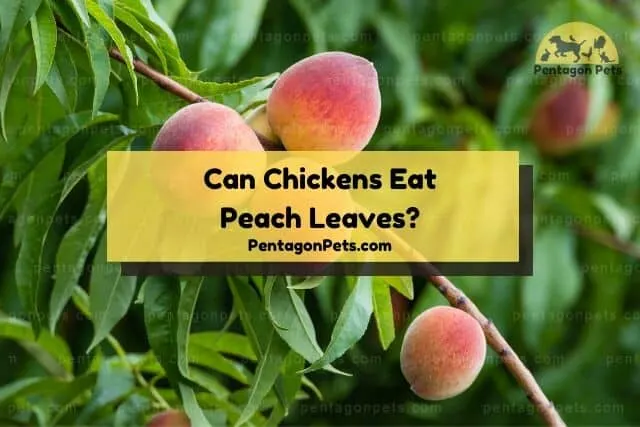
Chickens can eat peach leaves in moderation without any major health concerns. Peach leaves contain essential nutrients like vitamins and minerals that can contribute to a balanced diet for your chickens. However, it’s important to consider a few factors before feeding peach leaves to your flock.
When providing peach leaves to chickens, make sure the leaves are clean and free from any chemicals or pesticides. These substances can be harmful to your flock if ingested. Additionally, only feed your chickens fresh and healthy leaves, as wilted or damaged leaves can harbor molds and fungi that pose health risks.
If you have a peach tree in your backyard, it can be beneficial to allow your chickens to forage for the leaves on their own. This encourages natural feeding behavior and offers mental stimulation for the birds. Just make sure to keep an eye on the amount they consume, and supplement their diet with other greens and balanced chicken feed to ensure they receive all the essential nutrients.
Peach leaves can be included in a chicken’s diet safely, as long as they are clean and chemical-free. Monitoring their consumption and providing a varied diet will ensure the health and happiness of your flock.
Can Chickens Eat Peach Seeds?
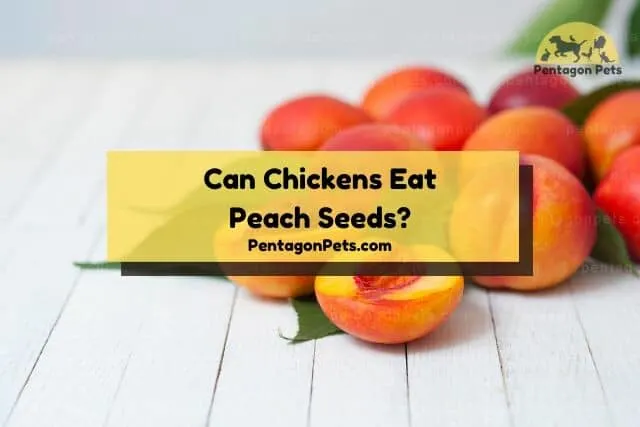
Chickens can enjoy the juicy and sweet flesh of peaches, but feeding them peach seeds should be avoided. Peach seeds contain a compound called amygdalin, which can break down into hydrogen cyanide when ingested. This can be toxic to chickens, causing respiratory issues, seizures, and even death.
This article was first published on September 12, 2023 by Pentagon-Pets.
While the risk of chickens consuming a single peach seed might be small, it is necessary to exercise caution as they can crack open the seed and expose the inner kernel that contains higher amygdalin concentrations. To avoid any health hazards, always remove the seeds before offering peaches to your poultry.
It’s also essential to be mindful of the amount of peach flesh one feeds to the chickens as moderation is key. Peaches, like other fruits, contain natural sugars, and excessive consumption can lead to obesity and other health issues.
Chickens should only consume the flesh of peaches after the seeds have been removed. Providing a varied and balanced diet, with occasional fruit treats, will ensure the health and happiness of your flock.
Can Chickens Eat Peach Tree/Plants?
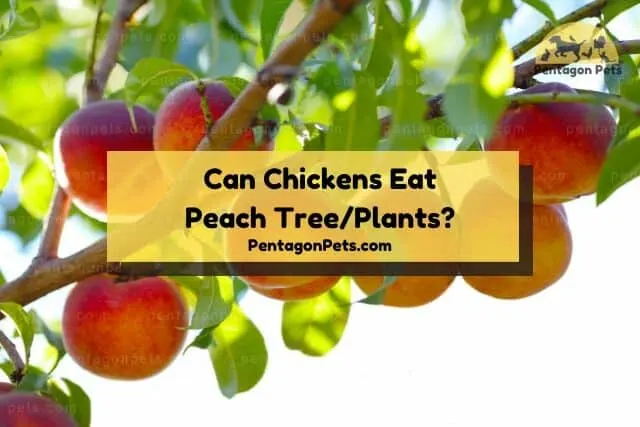
Chickens can eat peach tree leaves and the plants themselves, but caution should be exercised when feeding peach tree parts or plants to your flock. The main concern lies in the fact that peach tree leaves, branches, and pits contain amygdalin, a compound that releases cyanide when broken down. Cyanide is toxic for both humans and chickens.
However, chickens are likely to consume small amounts of peach tree leaves with no noticeable adverse effects. The digestive system of chickens is quite different from that of mammals, which means that they may be able to handle trace amounts of cyanide found in low levels from these plant parts. Nonetheless, it is best to monitor your chickens when they are foraging near peach trees and ensure that the consumption of leaves does not surpass moderate levels.
Pentagon Pet is the owner of this article that was first published on September 12, 2023.
The pits of peaches should always be kept away from chickens. While most chickens are not inclined to peck on large pits and stones, there is still a risk that they may accidentally ingest them and face considerable health hazards. Peach pits contain a higher concentration of amygdalin, making them particularly dangerous for consumption.
It is also important to remember that feeding your chickens a diverse and balanced diet will keep them healthy and well-nourished. Be sure to provide them with an assortment of grains, fruits, vegetables, and proteins to meet their dietary requirements. Including small amounts of peach tree leaves or plants in their diet can be relatively safe, but always ensure that it is a part of a varied and abundant feeding plan.
Chickens can safely consume peach tree leaves and plants in small amounts. They can handle trace amounts of cyanide released from amygdalin present in the vegetation. However, avoid feeding them peach pits as they are highly toxic. Monitoring your chickens’ foraging activities and maintaining a balanced diet will ensure their health and well-being.
Can Chickens Eat Canned Peaches?
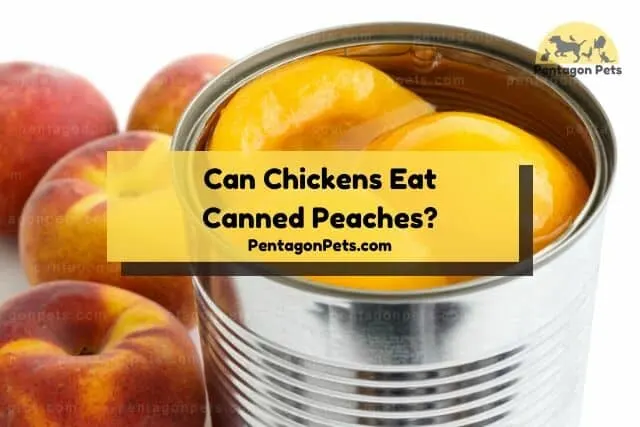
Chickens can technically eat canned peaches, but it is not the ideal choice for their diet. Canned peaches usually contain added sugar and preservatives, which are not beneficial for the chickens’ health. Additionally, the canning process depletes some of the fruits’ nutritional value, making it less advantageous for the chickens compared to fresh peaches.
When offering peaches to chickens, fresh, ripe, and unsweetened versions are preferable. Peaches provide chickens with essential nutrients, such as vitamins A and C, and are rich in antioxidants. Furthermore, fresh peaches serve as a source of hydration for chickens, as they contain a substantial amount of water.
If canned peaches are the only option available, it is crucial to rinse the fruit thoroughly to remove as much sugar and syrup as possible. Providing canned peaches to chickens should be an occasional treat rather than a staple in their diet, as they may not receive the full nutritional benefits compared to fresh ones.
While chickens can consume canned peaches, it is best to offer them fresh peaches whenever possible. It is essential to be mindful of the added sugar and preservatives found in canned fruits and how they can impact the chickens’ health.
Can Chickens Eat Rotten Peaches?
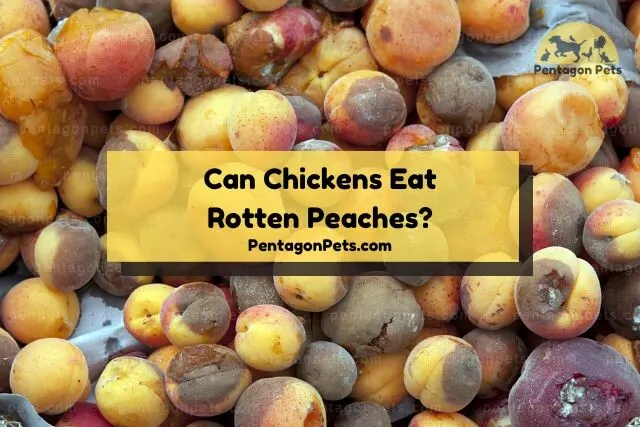
Chickens can consume a wide variety of fruits, including peaches, which can be a delicious and nutritious snack for them. However, when it comes to rotten peaches, it is not recommended to feed them to your chickens. Rotten fruit can harbor harmful bacteria and fungi that may pose health risks to the chickens.
Mold and bacteria grow on rotten fruit, which can lead to infections in your flock. For instance, molds produce mycotoxins that can damage the chickens’ liver, kidneys, and other vital organs. Consuming contaminated food can also cause digestive disturbances, leading to diarrhea and weakened immune systems in the birds.
Feeding chickens rotten peaches can also attract pests and insects to the coop. These unwelcome visitors can not only wreak havoc on your flock’s health but also spread diseases and create unsanitary conditions in the area.
This article and its contents are owned by Pentagon Pets and was first published on September 12, 2023.
While peaches can be a delightful treat for chickens, it is crucial to only offer them fresh and unspoiled fruits. Carefully monitor the quality of peaches you provide to your flock and promptly remove any that show signs of mold or decay to prevent potential health hazards.
